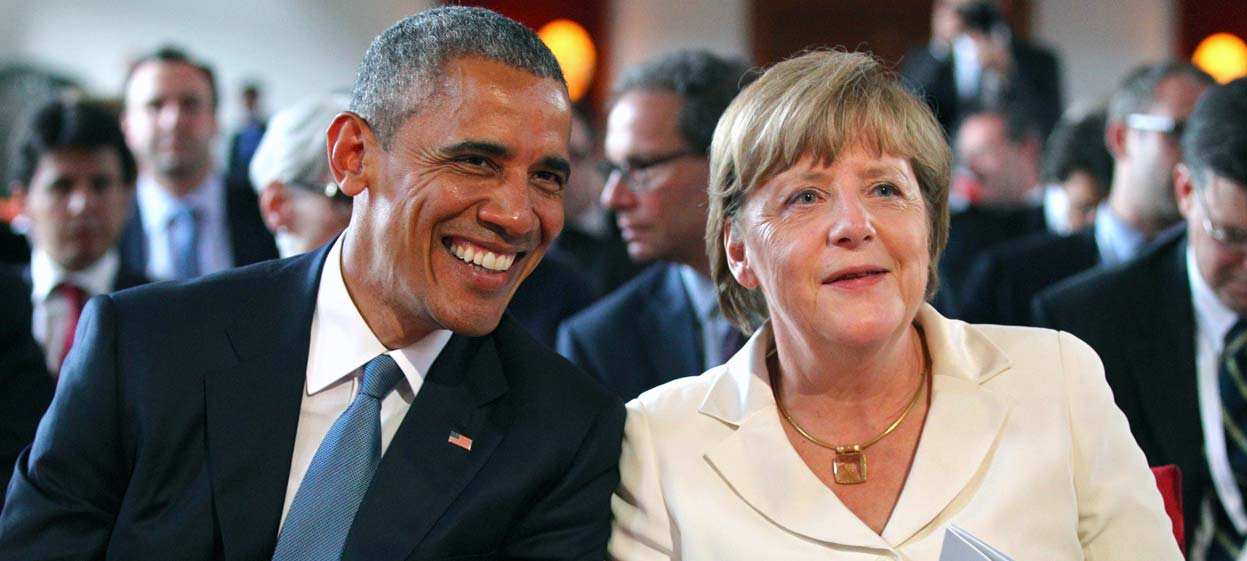Story Highlights
- A median of 41% in 2014 approved of Germany's leadership
- Greeks and Cypriots least likely in EU to approve
- Russians, Palestinians most disapproving
WASHINGTON, D.C. -- Worldwide, Germany's leadership has been as popular -- or almost as popular -- as the leadership of the U.S. in all but the two early years of President Barack Obama's administration. This includes 2014, when a median of 41% of residents in 135 countries and areas approved of Germany's leadership.
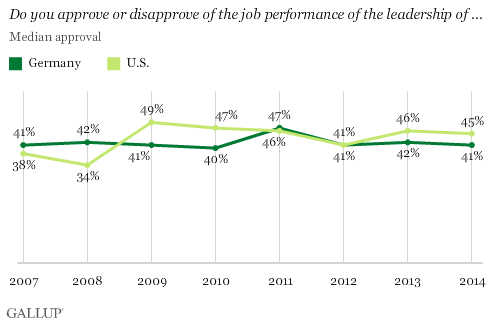
The approval rating of Germany's leadership in 2014, which for most of the world likely means long-time Chancellor Angela Merkel, was about where it has been for most of the past eight years. In 2007 and 2008, the last two years of the Bush administration, global residents actually held Germany's leadership under Merkel in higher regard than U.S. leadership. The chancellor has navigated through some trying economic and political times for Europe during her tenure, with Germany emerging as a leader throughout the eurozone's recent sovereign debt crisis and in Western diplomacy throughout the Ukraine conflict.
Germany's Leadership Most Popular in European Union
Majorities of residents in 46 countries approved of Germany's leadership in 2014. Illustrating the country's regional political and economic clout, more than half of these countries are in Europe. Nineteen of the countries are EU member states. The other five are countries or areas in Europe that are not part of the EU, including Kosovo, which gives Germany one of its highest approval ratings (77%) in the world.
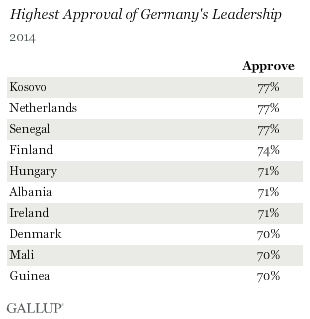
Germany's leadership gained popularity in some countries between 2013 and 2014, with approval ratings increasing by 10 percentage points or more in 11 countries. All except two countries are EU members, and this list notably includes all of the countries that received bailouts during the recent debt crisis, except Greece. In Greece, 29% approved of Germany's leadership -- though this is the highest rating since 2010, Greeks and Cypriots remained the least likely of all EU populations to approve.
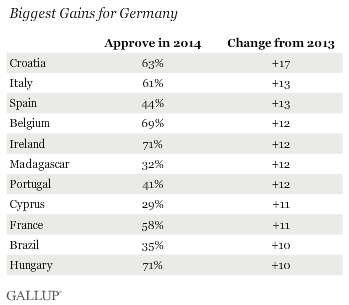
Russians, Palestinians Most Disapproving of Germany's Leadership
Residents in relatively few countries decisively disapproved of Germany's leadership. Majorities in eight countries disapproved, with this figure rising to two-thirds among Palestinians (67%) and Russians (66%). Residents in 26 countries were more likely to disapprove than approve.
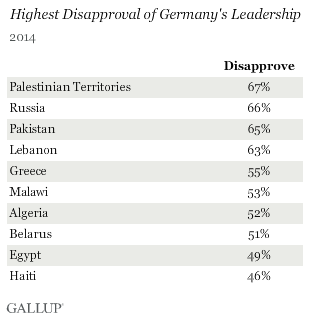
Approval of German leadership declined by at least 10 points in 13 countries between 2013 and 2014. The largest drop was 27 points in Kazakhstan, from 50% approving in 2013 to 23% in 2014. This drop may at least partly reflect the increasing tensions between the West and Russia over the situation in Crimea and eastern Ukraine. Ratings also dropped in other former Soviet states, including Russia (17 points), Belarus (11 points) and Uzbekistan (11 points).
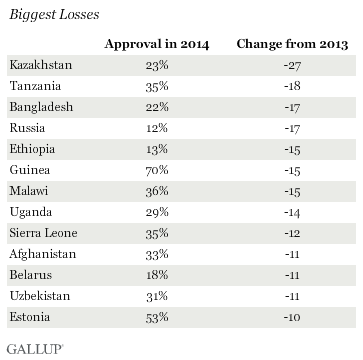
Although Germany's leadership earns high marks throughout much of Europe and Merkel is considered one of the world's most powerful women, the country's leadership remains unknown in many parts of the world. In 50 countries, more than four in 10 residents do not have an opinion about Germany's leadership, including residents in fellow G-7 member Japan (49%). In 23 countries, majorities do not have an opinion. The U.S., in comparison, is far better known: Majorities in just five countries do not have an opinion of U.S. leadership.
Still, while Germany's leadership is not as globally well-known as that of the U.S., it appears to be succeeding where the U.S. has not: Germany's leadership is popular both abroad and at home. A record-high 71% of Germans approved of their leadership last year, while in the U.S., only 35% could say the same about their own country's leadership.
The data in this article are available in Gallup Analytics.
Read the full report.
Survey Methods
Results are based on face-to-face and telephone interviews with approximately 1,000 adults, aged 15 and older, conducted throughout 2013 in 130 countries and 2014 in 135 countries. For results based on the total samples, the margin of sampling error ranges from ±2.5 percentage points to ±5.2 percentage points at the 95% confidence level. The margin of error reflects the influence of data weighting. In addition to sampling error, question wording and practical difficulties in conducting surveys can introduce error or bias into the findings of public opinion polls.
With some exceptions, all samples are probability based and nationally representative of the resident population aged 15 and older.
